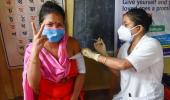We are entering 2022, facing another infectious variant, with much the same baseless confidence, notes Mihir S Sharma.

At the end of 2020, there were reasons to hope that the second year of the pandemic, 2021, would be better than the first.
If, that is, we in India learned the right lessons in India from our errors and misjudgements.
The iteration of my column that was published on January 2, 2021, titled 'Don't Repeat 2020', pointed out that, far from beating the virus, it was likely that another wave would hit soon if a new strain replaced the wild variant in India.
It also warned that if a more transmissible variant begins to race through the population, then vaccines would have to be rolled out much faster than planned -- although the government was not setting any real and rational targets for the rollout.
The March 2021 iteration of this column made similar points, if in a slightly more panicked tone, warning that India was not conducting enough genomic sequencing -- and that there was too much complacency about both the possibility of a second wave hitting us in the spring, and the speed and size of India's vaccine capacity.
We were, at that point, just weeks away from the nightmarish second wave that took away too many of our friends and relatives.
Under such circumstances, it is depressing to consider where we are as 2021 turns into 2022.
It is almost certain that we will once again repeat the same mistakes, born of brashness, over-confidence, and inefficiency.
There is practically no discussion in India of the fact that we have, for example, completely failed to meet the only real vaccination target we set for ourselves.
In May 2021, the then Union health minister told the public that every Indian adult would have received two shots by the end of the year.
We missed that target by quite some distance; less than two-thirds of eligible Indians have been vaccinated as of December 31, 2021.
This is no longer because of insufficient supply; it has been reported that the Serum Institute of India is sitting on 500 million doses of Covishield alone (as well as 150 million of the shot developed by Novavax).
It is simply another intermediation problem that the government at all levels -- Union, state, and local -- has been unable to solve.
It is worth noting that other countries have also paid the price for the Indian government failing to get its act together.
Every Serum Institute shot stockpiled or expired here is one that it has failed to deliver to the Covax programme that was supposed to inoculate the world.
India broke its expansive promises of vaccinating the world a year ago; Shruti Menon of the BBC points out that of the '700 million vaccines that have been delivered to 144 countries by Covax as of 14 December, around 40 million doses were provided by Serum Institute', and only 12 million of those have come since the second wave hit India in April/May 2021.
A recent Bloomberg article examined India's failures on genomic sequencing earlier in the year, which allowed the Delta variant to grow big quicker than it should have -- and which look awful particularly compared to how efficiently South Africa sequenced Omicron.
The article led to the usual hyper-ventilating by the usual hyper-nationalist suspects.
The real question, however, is why so few of us in India have held the testing and sequencing infrastructure to account after its failure earlier this year.
Has it got any better since?
Perhaps the biggest casualty of 2021 should have been wishful thinking.
Too many of us entered the year thinking that Indians were for some reason -- our inhospitable environment, our reliance on childhood vaccinations, our exposure to multiple disease vectors -- less vulnerable to a devastating Covid wave than other, softer countries.
That exceptionalism was as false as exceptionalism always is.
A year ago we thought that things would be relatively normal relatively soon.
We thought that masking and social distancing had become a bit of a bore.
All these assumptions proved to be not just wrong but dangerous as 2021 wore on.
And yet it seems we are entering 2022, facing another infectious variant, with much the same baseless confidence.
We imagine we have vaccinated enough; that our numbers are much better than some other countries; that this year, finally, we will be back to normality.
Yet we have an even less firm basis for these hopes on New Year's Day 2022 than we did on New Year's Day 2021.
Wishful thinking, complacency, and nationalist defensiveness almost killed us in 2021.
Surely we will not let the same faults ruin 2022?
Feature Presentation: Ashish Narsale/Rediff.com












 © 2025
© 2025